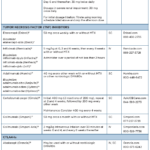NEW YORK (Reuters Health)—Adverse drug events (ADEs) are more common when drugs are used off label, especially when the off-label use lacks strong scientific evidence, researchers from Canada report.
“Our study demonstrated that physicians need to be cautious in prescribing off-label when there is a lack of strong scientific evidence for the use of the drug for a particular treatment indication,” Dr. Tewodros Eguale from McGill University, Montreal, Quebec, told Reuters Health by email. “As a result, physicians have to educate themselves or be equipped with computerized decision support systems to identify drugs and their approved and off-label indications and the scientific evidence associated with off-label uses.”
Off-label prescribing is common and, despite concerns that such prescribing contributes to preventable ADEs, there has been no systematic investigation of the effect of real-life off-label use on adverse events.
Dr. Eguale’s team used electronic health record data from Quebec to evaluate the association between off-label drug use and ADEs from January 2005–December 2010.
Almost 12% of prescriptions (17,847/151,305; 11.8%) were for off-label use, and 80.9% of these were for uses that lacked strong scientific evidence, according to the Nov. 2 JAMA Internal Medicine online report.
The overall incidence of ADEs was much higher for off-label than for on-label drug use (19.7 vs. 12.5 per 10,000 person-months).
For off-label drugs, the ADE rate was higher when the indication lacked strong scientific evidence than when there was strong scientific evidence supporting their use (21.7 vs. 13.2 per 10,000 person-months).
“Off-label uses with strong scientific evidence had the same risk of adverse drug events as on-label uses,” Dr. Eguale said.
ADE rates were highest for anti-infectives, followed by gastrointestinal tract drugs, central nervous system drugs, and cardiovascular drugs.
Other variables associated with higher ADE rates included use of more drugs, older age, female sex, and the presence of comorbidities.
“Not all off-label uses are bad, and drug prescribing depends on the context of the patient and the available drugs,” Dr. Eguale said. “Physicians should be active participants in the documentation of treatment indications and treatment outcomes. This, in the short term, will facilitate patient care and coordination of care between physicians and pharmacists, and it may also increase patients’ medication adherence.”
“In the long run, the documentation of treatment indications and treatment outcomes may help to replace the way physicians report adverse drug reactions to drug regulatory bodies,” Dr. Eguale said. “If treatment outcomes such as adverse drug reactions are documented in electronic health records, the need to ‘report’ in spontaneous reporting of adverse drug reaction will effectively be replaced with systematic documentation of adverse drug reactions and other outcomes.”


